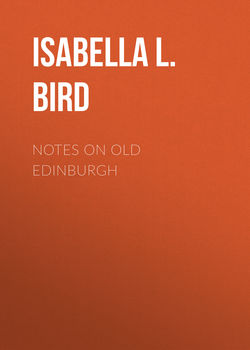Читать книгу Notes on Old Edinburgh - Isabella L. (Isabella Lucy) Bird - Страница 3
CHAPTER II
ОглавлениеIn the Old Town, where the population of a village or a fashionable square is constantly crammed into the six or seven storeys of one house, room-to-room visitation, for it is nothing else, affords a visitor in one morning a glimpse of a state of things without a parallel. In no other city could tenements be found without gas, without water-pipes, water-closet, or sink, or temporary receptacle for ashes, and entered only by one long dark stone stair, which return such enormous profits to their owners as from 45 to 60 per cent. Scarcely elsewhere does one roof cover a population of 290, 248, 240 persons, living in dens, honeycombed out of larger rooms, without ventilation, without privacy, and often without direct light. In no other city is the respectable mechanic compelled, for want of house accommodation of a proper kind, to bring up his family in a tenement which deserves indictment as a nuisance, or to pay £5, £6, or £8 a year for a den swarming with vermin, with only a wooden partition to keep off the sights and admit all the sounds of haunts of the most degraded vice. In Edinburgh, which, in more respects than one, is set on a hill and cannot be hid, there are 13,209 families, comprising not only the vicious and abject, but large numbers of the poorer labouring class, living in houses of but one room, and of these single rooms, 1530 are inhabited by from six to fifteen persons! Further, by the last census, 120 of these shelters, for they are not houses, were reported as without windows, and 900 were cellars, nearly all of them dark, and many damp. These figures give the astounding result that the families living in one room, and often herding together in closer proximity than animals would endure, comprehend 66,000 persons, or considerably more than one-third of the population of Edinburgh!1
The notes which follow are merely a commentary upon the above facts. My room-to-room visitation on a single day included thirty-seven families residing in a close south of the High Street and ten families in a close south of the Cowgate. I do not give the names of either, in deference to the feelings of respectable persons who are compelled by various causes to reside in them.
The entrance of the close which we selected is long and narrow, and so low as to compel a man of average height to stoop. It is paved with round stones, and from the slime in which they were embedded, and from a grating on one side almost choked up with fish heads and insides, and other offal, a pungent and disgusting effluvium was emitted. The width of this close is four feet at the bottom, but the projecting storeys of the upper houses leave only a narrow strip of quiet sky to give light below. A gutter ran along one side of the close against the wall, and this, though so early in the day, was in a state of loathsomeness not to be described. Very ragged children, infinitely more ragged and dirty than those which offend our eyes in the open street, were sitting on the edge of this gutter, sitting as if they meant to sit there all day; not playing, not even quarrelling, just stupefying. Foul air, little light, and bad food had already done their work on most of them. Blear eyes, sore faces, and sore feet were almost universal. Their matted hair and filthy rags were full of vermin. Their faces were thin, pinched, and precocious. Many of them had been locked out in the morning when their mothers went to their hawking, washing, and other occupations, and might be locked out till midnight, or later, as we found on the following night. There they sat, letting the slow, vile stream in the gutter run over their feet, and there they were sitting three hours later. They were from three to ten years old. It is all the same if the rain or snow is falling, except that they leave the gutters to huddle together in the foul shelter of the stair-foot. Some of these will die, many will be educated into the hardened criminality of the often-imprisoned street boy, many will slide naturally into a life of shame, and a fortunate few will be sentenced to reformatories, from whence they come out decent members of society at the rate of 70 per cent. “God help them!” exclaimed a mother, so drunk that her own babe seemed in peril in her arms. Ay, God help them! But our Father which is in heaven charges the responsibility of their destiny on the respectable men and women of Edinburgh.
1
Report on the Condition of the Poorer Classes in Edinburgh, 1868, p. 19.
